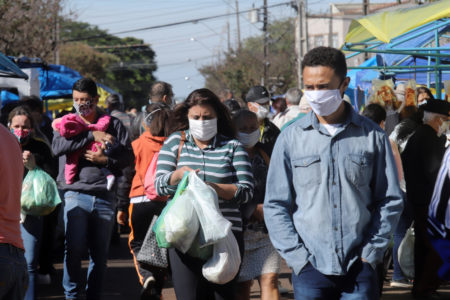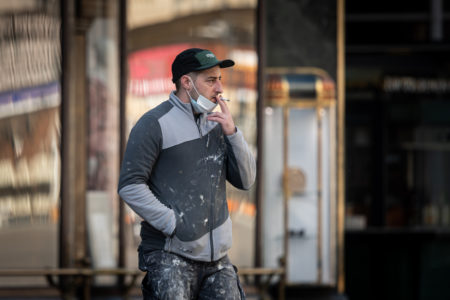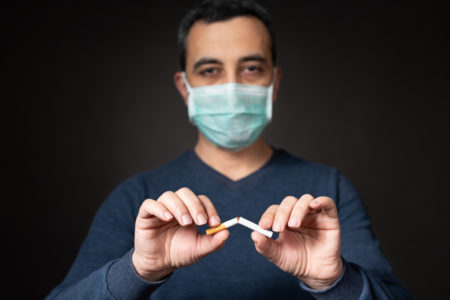
Share On Social!
The coronavirus pandemic has had a devastating impact on people of color.
Since the early days of the COVID-19 pandemic outbreak, one fact has been proven correct time and again: Minority groups face a higher risk of infection and the many burdens associated. This fact has been proven in a recent study from Massachusetts General Hospital.
“Radiologists from saw these disparities firsthand in April among patients admitted to the hospital with confirmed COVID-19 infection, and at one of the hospital’s respiratory infection clinics in Chelsea, a city just north of Boston that is home to a predominantly Spanish-speaking Hispanic community,” the researchers write. “A significant proportion of the patients who visited the Chelsea clinic had COVID-19, and the level of disease the radiologists observed on chest imaging was markedly more severe than that seen at other respiratory infection clinics in Boston.
“These disparities were more evident among patients admitted to the hospital with confirmed COVID-19 infection.”
Coronavirus and Lung Radiographic Severity Disparities in Latinos
Severe consequences of COVID-19 feature pneumonia and affects the lung function.
Worse, the CDC now states that U.S. adults with chronic illnesses, such as lung disease, heart disease, or diabetes, are at higher risk for severe COVID-19 outcomes than people without these conditions. People of color by-in-large suffer from these illnesses at higher rates than other groups.
This is important, as Latinos, Blacks, and other communities of color are three times more likely to contract coronavirus than white Americans.
COVID-19 attacks the epithelial cells lining the airways and that catch and clear out things like pollen and viruses, which later causes flooding of airways with debris and fluids, according to an American Lung Association report.
Latinos are experiencing coronavirus-related lung infection at greater rates than their white peers, a recent study published in Radiology notes. 
Researchers looked at chest X-rays of 326 patients hospitalized with coronavirus between March 27 and April 10, and each patient was given mRALE scores based on how severely the disease had impacted their lungs.
Latino patients scored 1.5 times worse score of 6.1 while non-Latino white scores 4.2.
The study suggests that increased radiographic severity among Latinos is associated with delayed presentation, low English proficiency, and obesity.
“Limited English proficiency is an additional socioeconomic factor that really influences many aspects of access to care,” study co-author Dr. Efren J. Flores, a radiologist from Massachusetts General Hospital, said at a press release. “When we were first learning how the disease spreads, there was all this rapidly evolving information coming out that was not available in languages other than English, and that lag in the availability of actionable health information for non-English speaking individuals was really critical for many patients trying to navigate a complex medical system with a disease from a virus that is so aggressive.”
Why Should this Study Concern Latinos?
Your body has a natural defense system designed to protect the lungs.
Lung health is essential, even more so with a COVID19 pandemic that affects the respiratory tract.
Along with maintaining hygiene and practicing social distancing, having healthy lungs is very important and will help in one’s survival during this pandemic.
One area that can severely impact coronavirus infection is smoking.
This practice causes significant changes in the lungs and airways, and the effects of tobacco remain even years after someone has ditched cigarettes.
Latinos generally have lower rates of smoking than other racial/ethnic groups, except for Asian Americans. However, smoking remains a severe and continuing problem in the Latino community.
Millions of Latino teens are hooked on vaping and e-cigarettes. 
One in three young adults is at risk of severe Covid-19, according to new research in the Journal of Adolescent Health — smoking plays a big part in that risk.
The most notable result of the study was that medical vulnerability stood at 16.1% for the 6,741 non-smokers, versus 31.5% for the full sample of 8,405 young adults, which included smokers.
Smokers are more likely to develop a severe case of COVID-19, compared to non-smokers, according to a recent meta-study by UCSF public health experts.
Moreover, across the U.S., there has been a shocking number of Latino COVID-19 deaths for ages 35 to 64, and many studies show that obesity, which adversely affects lung function, maybe one of the most important predictors of severe coronavirus illness among young patients.
Public health experts have identified numerous economic and social conditions that contribute to the disproportionate impact of COVID-19 on Latinos. Many of these issues are tied to systemic discrimination and structural racism.
Hence, these data reinforce the disparate impact of COVID-19 on people with color amid worsening historical inequities.
‘Quitxt’ Can Help You Quit Smoking and it Can Help You to Improve Your Lung Function
“Quitting during this pandemic could not only save your life, but by preventing the need for your treatment in a hospital, you might also save someone else’s life,” Dr. Jonathan Winickoff, director of pediatric research at the Tobacco Research and Treatment Center at Massachusetts General Hospital, told the New York Times.
 If you are interested in quitting cigarettes and vaping, join Quitxt, a bilingual smoking cessation program for your smartphone that sends messages with culturally and regionally tailored support to help South Texas young adults quit smoking.
If you are interested in quitting cigarettes and vaping, join Quitxt, a bilingual smoking cessation program for your smartphone that sends messages with culturally and regionally tailored support to help South Texas young adults quit smoking.
“If you’re thinking about quitting smoking and you’re always on your phone, Quitxt is a perfect program for you, whether you speak English or Spanish,” said Dr. Amelie G. Ramirez, director of Quitxt and the Institute for Health Promotion Research at UT Health San Antonio.
The service uses text messages, or Facebook Messenger chat to help with motivation to quit, setting a quit date, finding things to do instead of smoking, handling stress, using nicotine replacement if needed, and more.
Join Quitxt via Facebook Messenger, just hit “send message”!
Learn more about the Quitxt message program in English or Spanish to help you quit smoking today!
Explore More:
Healthcare AccessBy The Numbers
142
Percent
Expected rise in Latino cancer cases in coming years



